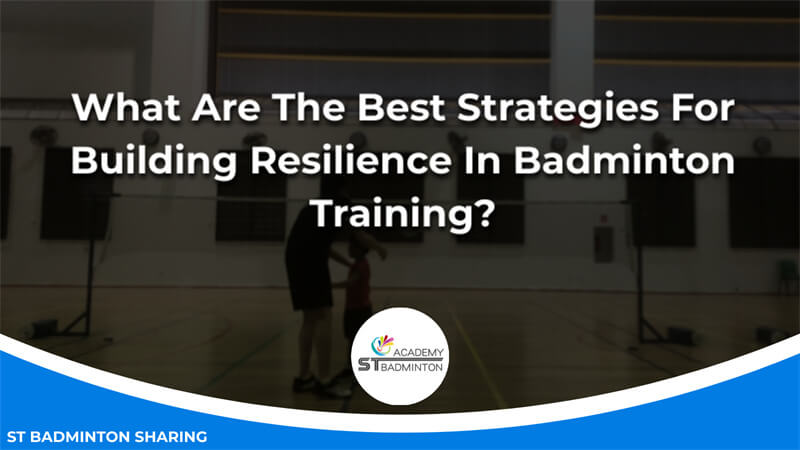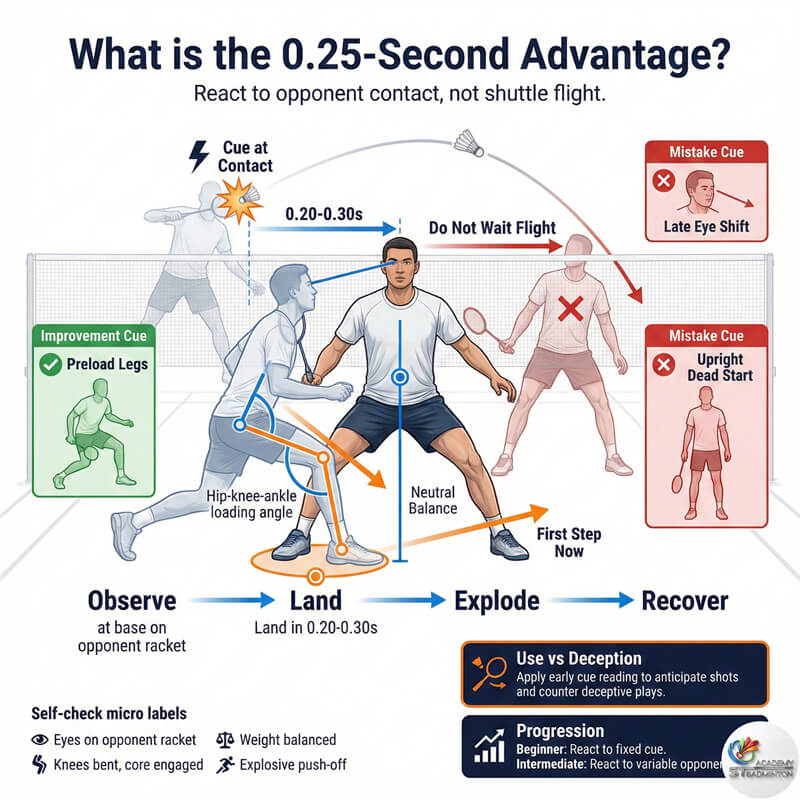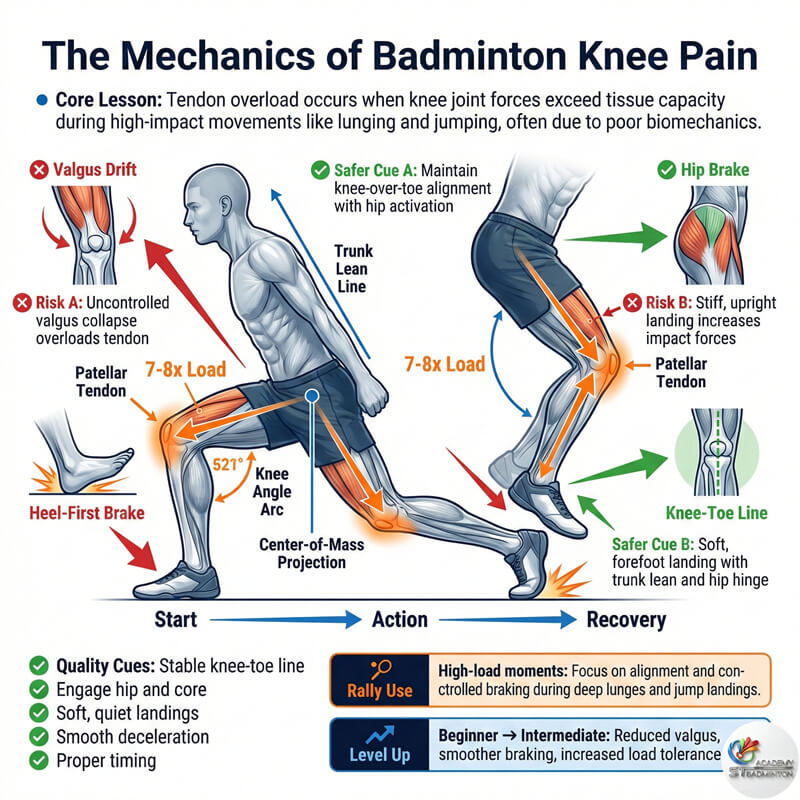Welcome to ST Badminton Academy’s badminton training in Malaysia! As we all know, the key to success in any sport is having both physical and mental strength. Therefore, it’s essential that players of any sport – including badminton – build resilience as part of their regular training regime. In this article, I will discuss some of the best strategies for building resilience during badminton training so that you can hit those winning shots with confidence!
Setting Realistic Goals
As a badminton training and resilience coach, it’s important to help athletes set realistic goals. Setting boundaries on short-term objectives can help keep the athlete focused while also preventing burnout. Looking at progress over time is essential for gauging your improvement in any sport. After all, tracking progress allows you to recognize what works best and make adjustments as needed.
It’s crucial to stay motivated during badminton practice – no matter how difficult or challenging it may be – so that you don’t give up too soon when success seems far away. A helpful tip is to break down long-term goals into manageable chunks of smaller successes so that small wins are celebrated too!
In order to achieve peak performance in badminton, players must prioritize both physical and mental toughness. Mental strength helps athletes push through tough moments during games and persevere even when times get hard. It’s important for athletes to find ways to stay positive amidst challenges and use their energy towards growth instead of self-doubt. With this mindset in place, practicing mental toughness becomes easier as we move forward with our badminton trainings and build resilience along the way.
Practicing Mental Toughness
Having realistic goals is a great start in building resilience for badminton training, but it’s also important to practice mental toughness. Mental toughness can help you stay motivated and focused on your progress while helping you overcome fear. It takes time and effort to develop mental strength, but with consistent practice, everyone has the potential to become mentally tough.
One way of developing this skill is by understanding how fear works. Fear can be useful when managed correctly – it can motivate us to improve our skills so we are better prepared for future challenges. But if left unchecked, fear can paralyze us from taking risks or trying something new that could ultimately benefit us in the long run. Acknowledge your fears and channel them into determination instead of letting them hold you back from reaching success.
Knowing yourself and recognizing patterns of behavior is another key element of mastering mental toughness. Everyone reacts differently under pressure; some may feel more anxious than others or handle stress differently. Pay attention to these reactions when stressful situations arise so that you can adjust accordingly and make sure not to let emotions get in the way of performing at your best level during competitions or challenging practices. By focusing on self-awareness and accepting what you cannot control, you will stay focused on the process rather than worrying about results that may be out of your hands.
Focusing On The Process
Have you ever thought about why some badminton players manage to stay resilient despite the challenges they face? Building resilience doesn’t happen by chance – it takes a concerted effort and focuses on specific strategies. Here are 3 key approaches for building resilience in badminton training:
| Building Resilience in Badminton Training | Approaches |
|---|---|
| Embracing Failure | Embrace failure as an essential part of learning and growth in badminton. View mistakes as opportunities for development. Develop a comfort with failure to bounce back effectively from setbacks. |
| Tracking Progress | Keep a record of small victories throughout your training journey. Recognize that progress may not always be linear or immediate, but there are areas of improvement along the way. Celebrate even the smallest successes to reinforce positive momentum. |
| Utilizing Positive Self-Talk | Combat negative self-talk by replacing it with positive affirmations. Cultivate habits of affirming statements like “I am doing my best today” or “I have what it takes to succeed.” Building this positive self-talk habit over time contributes to the development of resilience and long-term success in badminton training. |
With these three strategies in hand, we’re ready to explore further techniques that can help us become more resilient while playing badminton – starting with utilizing positive self-talk!
| Building Resilience in Badminton Training | Strategies |
|---|---|
| Utilizing Positive Self-Talk | – Focus on positive reinforcement rather than dwelling on mistakes. – Use constructive feedback to learn from mistakes quickly. – Become aware of thought patterns and replace unhelpful ones with encouraging language. – Practice positive affirmations both internally and vocally. |
| Developing Self-Awareness | – Be aware of emotions during training and matches. – Check in with the body and mind before games to understand the current mindset. – Build confidence through small, achievable goals. – Utilize techniques like positive self-talk and visualization to reframe experiences and setbacks. – Recognize emotions and build confidence for mental and physical success in badminton. |
| Learning From Mistakes | – Acknowledge failure as part of the learning process. – Analyze performance after each match or practice session. – Ask questions for self-reflection: What went well? How can I improve? What needs work? – Be kind to yourself, using failures as opportunities for growth. – Develop long-term resilience by learning, improving, and staying patient and dedicated. |
| Taking Care Of Your Health | – Engage in regular exercise to reduce stress and build strength and stamina. – Ensure sufficient and restful sleep for physical and mental recovery. – Consume a nutritious diet for sustained energy during training sessions. – Choose healthy snacks to support energy levels and overall well-being. – Recognize the importance of not only performance but overall health for better decision-making on the court. |
| Building Supportive Relationships | – Seek feedback from mentors or peers who have faced similar challenges. – Foster an environment of trust and understanding through meaningful connections. – Build relationships based on mutual trust and respect with coaches, teammates, opponents, friends, or family members. – Connect with those who can provide encouragement and support during difficult times in training or competitions. |
| Mindful Breathing Techniques | – Practice mindful breathing exercises to bring calmness to moments of stress. – Dedicate five minutes each day to mindfulness for reduced anxiety and improved concentration. – Develop the necessary skills for dealing with challenging circumstances in both sports and life through regular practice of mindful breathing techniques. |
Utilizing Positive Self-Talk
I’m a strong believer that positive self-talk is the foundation of all successful badminton training. We need to be able to talk ourselves up when things don’t go our way and stay resilient in the face of adversity. It’s important for us to focus on positive reinforcement, rather than dwelling on mistakes or negative outcomes. When we do make mistakes, constructive feedback can help us learn from them quickly and move forward with confidence.
It starts by becoming aware of how our thoughts shape our behavior and performance during practice sessions. Knowing what kind of language we use when talking about ourselves matters greatly –– especially if it’s not serving us well! In order to build resilience, we have to recognize those unhelpful thought patterns and replace them with something more encouraging and uplifting instead.
We must also become conscious of the words we use while speaking out loud – either alone or around other people who are involved in our badminton training journey. Positive affirmations can create an environment where learning becomes enjoyable, even if there are setbacks along the way. With this awareness comes clarity and greater understanding; allowing us to get back into action faster with renewed motivation!
Developing self-awareness is key for building resilience during badminton training; it helps keep us accountable and aligned with our goals so that each setback brings us one step closer to success!
Developing Self-Awareness
Developing self-awareness is crucial to building resilience in badminton training. It’s important to be aware of your emotions and recognize them as they arise so that you can work through any mental blocks or obstacles that may appear during a match. I often recommend my clients take a few moments before the start of each game to check in with their bodies and mind, noting down any feelings that come up for them. This helps to create an understanding of how their current mindset affects performance on the court.
Building confidence is key when it comes to developing long-term resilience in badminton training. Taking small steps toward achieving goals allows us to stay focused on our progress rather than dwelling too much on failures or mistakes. When we do make errors, there are some great techniques out there such as positive self-talk and visualization which can help us reframe those experiences into learning opportunities.
By recognizing our emotions and building confidence, we set ourselves up for success both mentally and physically while playing badminton. We become more adept at facing challenging situations knowing that failure isn’t necessarily permanent; instead, we can use these experiences to strengthen our resolve moving forward by learning from our mistakes. With this approach, we can remain resilient even under pressure, continuing to improve our skills no matter what obstacles might present themselves along the way.
Learning From Mistakes
Have you ever wondered how the best badminton players stay so resilient in their training? It’s not just a matter of physical strength or technique; it also requires mental resilience. Learning from mistakes is an important part of building this type of resilience and improving your game.
The first step to learning from your mistakes is acknowledging failure. This means accepting that even if you make a mistake, it doesn’t mean you are any less capable as an athlete. Instead, focus on analyzing your performance after each match or practice session. Ask yourself questions like: What did I do well? How could I have improved my play? Which areas need more work? Taking time for self-reflection allows you to understand what went wrong, figure out what needs improvement, and take steps toward becoming a better player.
One last thing to remember when learning from mistakes is to be kind to yourself along the way. Don’t beat yourself up over small failures and instead use them as opportunities for growth. With some patience and dedication, taking these steps can help build long-term resilience in your badminton training and set you on track for success! Now let’s move on to taking care of your health while playing badminton
Taking Care Of Your Health
Once you have learned from your mistakes, the next step in building resilience is to take care of your health. Working out and eating a healthy diet are essential components of this process. Regular exercise helps reduce stress while also helping to develop strength and stamina that can be used on the court. Additionally, making sure you get enough restful sleep is important for both physical and mental recovery after training sessions or matches. Eating nutritious meals gives you the energy to keep going when training gets tough and helps your body recover quickly afterward.
You should also pay attention to what type of fuel you’re putting into your body during practice. Having snacks like nuts, fruits, granola bars or protein shakes will help sustain your energy levels throughout the session so that you remain focused and motivated. As a badminton player, it is important not just to think about performance but also overall well-being: fueling yourself with proper nutrition keeps your mind sharp which allows for better decision-making on the court as well.
Resilience isn’t just an individual effort; having strong support systems around you can make all the difference in times of difficulty or failure. Connecting with others who understand where you’re at mentally can be helpful in staying positive by providing much-needed encouragement or simply being there to listen — whether they’re coaches, teammates, opponents, friends or family members. Building relationships based on mutual trust and respect will go far beyond simple wins and losses; working together builds stronger foundations for success!
Building Supportive Relationships
As a badminton training and resilience coach, I firmly believe the most important strategies for building resilience are those that involve meaningful connections with others. When we build supportive relationships, our ability to cope with difficult situations increases exponentially.
One of the best ways to foster these relationships is by seeking feedback from mentors or peers who have faced similar challenges. Not only does this provide helpful advice on how to proceed in different situations, it also creates an environment of trust and understanding between us and those around us. This can be incredibly reassuring when times get tough and having such connections will make it easier to roll with the punches.
Mindful breathing techniques can also help to bring calmness into moments of stress. Taking just five minutes out of your day for some mindful breathing exercises can reduce anxiety levels as well as improve concentration – both necessary skills for any athlete looking to develop their resilience further. Through regular practice, you’ll soon find yourself better equipped at dealing with challenging circumstances in both sport and life! Other than choosing a good racket and also remember to choose the best racket restring in Malaysia.
Frequently Asked Questions

What Is The Most Effective Way To Set Realistic Goals For Badminton Training?
Setting realistic goals for badminton training is essential to build resilience and achieve success. As a badminton coach, I recommend having self-discipline and managing your time wisely when creating these goals. Start small by setting daily or weekly objectives that are easily achievable then gradually increase the difficulty as you go along.
Take into account all the other commitments in your life too so that you don’t become overwhelmed. With patience and dedication, you will be able to reach those long-term goals!
How Can I Develop Mental Toughness For Badminton Training?
If you want to develop mental toughness for badminton training, then look no further! As a seasoned badminton resilience coach, I can tell you that visualizing success and having coping mechanisms are essential. Visualize yourself playing like a pro – the power of positive thinking will help you become mentally tougher in the long run.
Coping strategies such as deep breathing can also be incredibly helpful when dealing with difficult situations during matches; this helps keep your mind focused on the task at hand so that victory is well within reach!
What Activities Should I Do To Focus On The Process For Badminton Training?
If you’re looking to build resilience while training in badminton, focus on the process of practice. Start by setting achievable goals and breaking them down into smaller, more manageable tasks. Make sure to include skill drills during your practice sessions – it’s important to take a step back and focus on honing specific skills that will help you reach those goals. Doing so helps give structure and purpose to each session, allowing you to stay focused throughout your training.
How Can I Use Positive Self-Talk To Improve My Badminton Training Performance?
“When it comes to badminton training, one of the best strategies for building resilience is using positive self-talk. Positive affirmations and mental visualization are two key components that can help you take your game to the next level. Think of them as tools in your ‘badminton toolbox’ – they’re there when you need a pick me up after a tough match or practice session.
Picture yourself succeeding at each point and use phrases like ‘I’ve got this’ or ‘I am confident I will succeed’ to stay focused on the process and stay resilient when times get tough. It’s all too easy to give up during challenging moments but by putting these tools into action, you’ll be able to hit those shots with more confidence than ever before!”
What Are Some Ways To Build Supportive Relationships That Can Help With Badminton Training?
As a badminton training and resilience coach, I always encourage my clients to build supportive relationships that can help with their badminton training. Having people around us who understand our skill-building process is essential for maintaining motivation.
Self-care should also be emphasized when it comes to forming those connections; if you don’t take the time to nurture yourself, your relationships won’t feel as fulfilling or motivating. Taking breaks from practice in order to spend quality time with friends and family will help keep you focused on your long-term goals.
Building Resilience in Badminton Training Malaysia
When it comes to building resilience in badminton training, the most important thing is to set realistic goals and focus on the process. With mental toughness, positive self-talk, and supportive relationships, you’ll be able to take your game up a notch.
So let me challenge you—dare yourself to push harder than ever before! Dare yourself to keep going even when it feels like giving up. If you do that, I guarantee that you will reap the rewards of hard work and dedication in no time at all!





